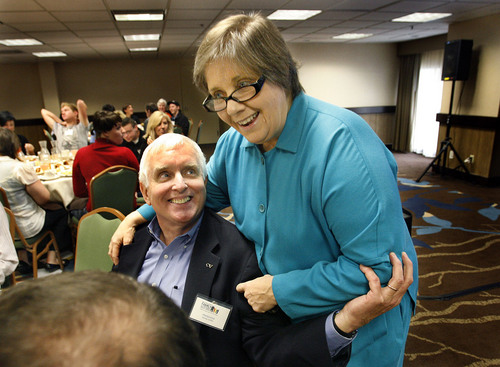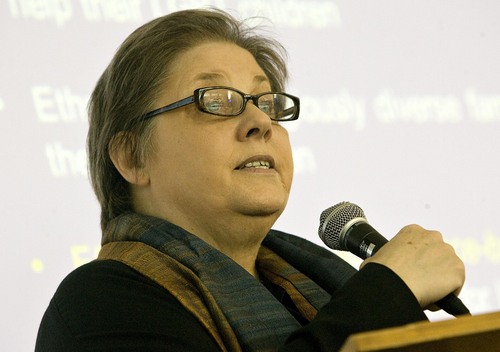This is an archived article that was published on sltrib.com in 2014, and information in the article may be outdated. It is provided only for personal research purposes and may not be reprinted.
For more than 25 years, Caitlin Ryan has studied the impact of a family's response to the news that their child is gay.
Ryan, a researcher at San Francisco State University, says the evidence could not be more clear: If a parent greets the announcement from their lesbian, bisexual, gay or transgender (LGBT) offspring with anger, rejection, dismissal or harsh judgment, the son or daughter is more likely to become homeless or suicidal, while a positive message of love can protect the life, health and well-being of the youth or young adult.
With such findings in hand, Ryan then created the Family Acceptance Project, and in June 2012, wrote and produced a booklet with Mormon bishop Robert Rees, titled "Supportive Families, Healthy Children: Helping Latter-day Saint Families With Lesbian, Gay, Bisexual & Transgender Children."
Now the Family Acceptance Project is applying that research and expanding its prevention efforts to familiies across Utah.
This week, the group announced it has tapped the Rev. Marian Edmonds Allen, who has served as the director of OUTreach Resource Centers in Ogden for the past two years, as its new national program director.
Edmonds Allen, a United Church of Christ pastor, will coordinate this critical new program to prevent suicide and homelessness for LGBT youth while expanding the training, consultation, family intervention and faith-based work.
"This is life-saving work," Ryan said in a phone interview.
Suicide is the second leading cause of death for Utah youth ages 10 to 17 and young adults ages 18 to 24 — higher than the national average. Studies have found that LGBT youth are at least three times more likely than heterosexual youth to attempt suicide and about four times more likely to make a medically serious suicide attempt, she said. More than 5,000 youth are estimated to experience homelessness in Utah per year. Of these, at least 40 percent are LGBT and the majority are from religious and socially conservative families, with 60 percent from Mormon homes.
In recent weeks the number of newly homeless LGBT Mormon youth who sought help from community agencies increased fivefold, said Edmond Allen, who observed this at her OUTreach job. "I realized I need to do this. The Family Acceptance Project can be a game-changer here."
While interviewing homeless LGBT Mormon youths, Ryan was struck by their "profound isolation and despair," she said. "They were cut off not only from their family, but [also] from their faith, their community, their future."
She wanted to find a way to "build on the innate strength and compassion of Mormon families, empowering them to care for their children."
A cornerstone of the project's work, she said, "is to help families understand that they don't have to choose between their LGBT children and their faith."
Ryan and Edmonds Allen plan to spread the word at educational events, public libraries, community centers and church gatherings in private homes about ways for families to talk with their gay kids. They will continue to speak about their work at professional conferences and with ecclesiastical leaders, while creating a network with organizations such as Mormons Building Bridges, Parents and Friends of Lesbians and Gays and LDS Family Fellowship, all working to support gay Mormons.
"We want to work with families before they kick out their kids," Edmonds Allen said. "I am going to go systematically around the state so people can learn about these resources."
Eventually, organizers will evaluate how it is working in the Beehive State, and possibly launch it in other places as well.
"We have to bring this to people in every place where they live their lives," Ryan says. "People are eager for accurate information to help their children, to know how can they keep their child safe and build their self-esteem."





